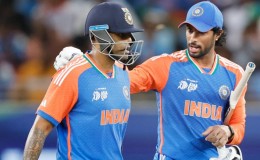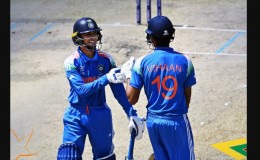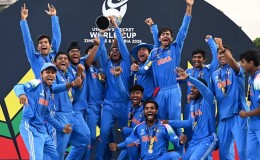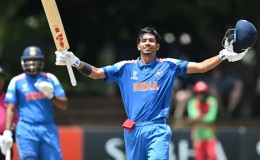Sachin Tendulkar, 40, was bowled thrice in four innings in the just concluded India-New Zealand Test series, prompting many to announce his end as a quality batsman. However Sanjay Manjrekar felt that Tendulkar still adds value to Indian batting line-up and he must be a part of the Indian side which will tour South Africa in November, says a report in The Indian Express. “To me, the way Tendulkar got out in his three innings against New Zealand does not suggest by any stretch of the imagination that he is finished as an international batsman.
“I will stand by what I have said all along about Tendulkar: that his run-making at the international level will stop only when he stops playing. Until then, he may not dominate as he used to but he will still be a good enough batsman to get runs at the highest level, and to add value to the Indian team, especially in Test cricket,” Manjrekar wrote in his column for Cricinfo. Manjrekar argued that Tendulkar is not first batsman who is struggling with full length deliveries and the fighter in him will surely sort out this batting problem.
Meanwhile a Times Of India column says that there's no denying the sheer impact of Sachin Tendulkar's two-decade-long career on the cricketing world and the master blaster's class and brilliance have dazzled fans around the globe, while terrorising bowlers of all pedigrees. “However, the recent two-match Test series against New Zealand showed a man well into the evening of his career. There's no doubting Sachin's love for the game, but at 39 his body is putting out signals that he would do well to heed. Having his stumps uprooted thrice in a row against average Kiwi bowlers bears testimony to Sachin's slowing reflexes. The will to perform is there, but execution is proving to be a challenge,” says the TOI, adding that kKnown for making comebacks, Sachin may yet turn around his form.
“But with age, his comebacks are getting increasingly painful. No matter what he does from this point onwards, his place in cricketing history is assured. In addition to being the highest run scorer in both formats of the game, Sachin's record of 100 international centuries is likely to remain a benchmark for a very long time. He will always be remembered as the first batsman to break the 200-run barrier in One-Day Internationals, while his legacy will continue to inspire generations of Indian cricketers to come. In such a scenario, Sachin has little else left to prove or achieve,” says TOI.
Meanwhile a column in The Hindu says that sporting mortality might appear alluringly predictable, but we have to be rather cautious when making sweeping statements in the rarest of rare cases — the ones involving men such as Pete Sampras, Sachin Tendulkar, Roger Federer and Tiger Woods.
“Windbag discussions about their impending demise can hurt us more than it does damage to great athletes. Of course, experts who have played the game at the highest levels deserve to be heard, but you cannot conduct a nation-wide referendum on the question whether it is time for Sachin to quit. Nor, for that matter, can we simply pick someone from Central Casting to take on Sachin’s role in the Indian team overnight. For, this is a man who has dominated the Indian sporting landscape for almost a quarter of a century — a rare and luminous talent who has withstood years and years of hype-laden canon-making and undeserved criticism alike to achieve feats of surpassing greatness,” says the column, adding that his longevity and skills have created an almost compelling illusion that time itself may be an illusion.
“Only the greatest of the great can make it appear that timelessness may be a reality. Now, as he finds himself surfing the chaotic waves, with questions regarding his footwork consuming as much newsprint and television time as Coalgate and assorted other scams, we must acknowledge that Sachin is intelligent enough to know that he is a mortal, however much millions might have believed — when he was at his peak — that he wasn’t.”.










